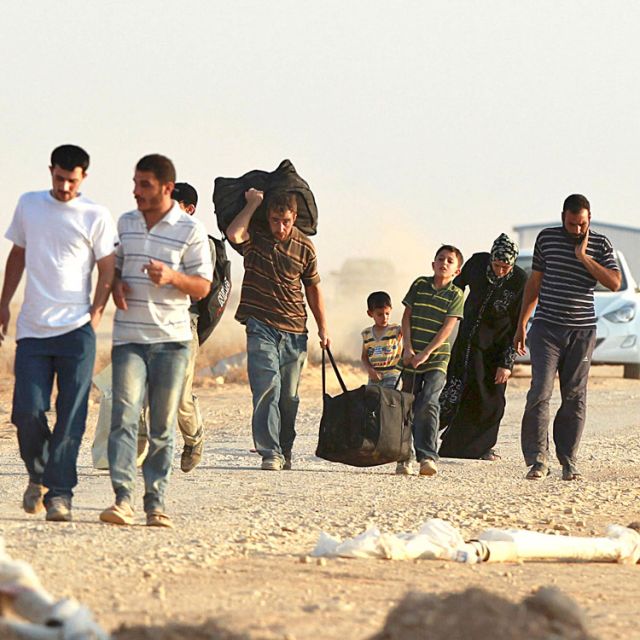Aid is getting to displaced Christians fleeing the fighting in Syria, but there's no telling how Syria's Christian minority will cope as fighting shifts and the country's new reality takes shape.
"Based on our frequent contacts with our partners in Syria, I can say that they are still able to meet the demand (for emergency shelter, food, medicine and clothing). However, the question is for how long?" Issam Bishara, Catholic Near East Welfare Association regional director, told The Catholic Register in an e-mail from Beirut.
Numbers of internal refugees are on the rise as fighting spreads throughout Syria, Bishara said.
CNEWA is delivering aid to Christians and Muslims through the Sisters of the Good Shepherd in Damascus and in Akrama-Homs, the Greek Melkite Patriarchate of Antioch in Damascus, the Greek Orthodox Patriarchate of Antioch working with families displaced from Homs and Wadi al Nasarah (Valley of the Christians) and the Melkite Greek Catholic parish in Al Qaa, a Lebanese village on the border with Syria.
Christians haven't been targeted in the fighting so far, said Samer Laham, the Greek Orthodox director of ecumenical relations and development.
"Christians are affected as well as Muslims in the country," said Laham in an e-mail from Damascus. "In some places they are targeted because they live in one area and that area has been invaded by rebels and is being shelled by government security forces. Rebels in many places tend to go to the Christian areas to find refuge and protection, which is the reason they put the Christian populations at risk."
Syrians have seen what happens when a Baathist government falls. The overthrow of Saddam Hussein's Iraqi government in 2003 by American-led forces triggered an exodus of close to two million refugees who crossed the Iraq-Syria border.
While Middle-Eastern Christians may not have loved the old dictatorships of Iraq, Syria and Egypt, they're fearful of the alternatives on offer.
"They are seeing what is happening in other places and have found no success stories of democracy in the Arab world are taking place," said Laham. "Christians are afraid of the new, coming system that is not clear at all."
Fundamentalist politics based on an appeal to religion as a bulwark against a corrupt, foreign culture isn't the only problem Christians face in the Middle East.
"Christians are always the weaker body and pay the price of other conflicting groups," said Laham. "This is why they might be an easy target for revenge from all other parties."
Laham rejects the idea that Syria is engulfed in civil war.
"We are not witnessing a civil war yet and hope not to witness that at all," he said.
He blames outside forces for an escalation in violence.
"The war can stop if the external powers stop arming the so-called Free Army and stop sending terrorists for jihad in Syria," he said.
CNEWA Canada has launched an emergency appeal to support Syrian Christians as they deal with fallout from the fighting.
"if we could reach $100,000 by Christmas that would be good. If we could get more that would be better," said Carl Hetu, CNEWA Canada's executive director. "The needs are changing and increasing every day as the war intensifies."
Syrian Christians have become advocates for peace and dialogue as the conflict rages, said Hetu.
"A lot of the good stories are about Christians welcoming the Muslims, sharing their food, praying together," said Hetu. "And Shiites and Sunnis welcoming Christians into their homes. Those are the stories not told, but are happening."
The crisis has spurred Syrian churches to work ecumenically for less violent solutions to the political impasse.
"They found a new vocation — a vocation of dialogue and peace," Hetu said. "This is the vocation of the Christian in the Middle East, not only in Syria. If there's a lesson learned in Iraq it's that the churches can play a uniting role if they are united and they show that among themselves they can be. The Church, if it continues to play this role when the fighting is over, it can help the healing."
But that doesn't mean Christian communities in Syria are secure.
"The problem is being a minority and being in villages. When they leave, what will happen to their property? What will happen to them? Are they going to come back?" Hetu asks. "Any kind of disturbance in the daily life of Christian villages or communities, nobody is sure it will be the same once the war is finished. Will they go back to their villages? Will the balance of power be the same?"
Toronto Christians unite in prayer for Syria
Prayers for peace in Syria have united a large swath of Christians in Toronto. A dozen churches, Protestant, Orthodox and Catholic, came together at St. Mary Armenian Apostolic Church Aug. 9 for a three-hour weeknight ecumenical prayer service.
St. Mary's in the northeast corner of the city was full to overflowing with Christians who have relatives and friends in Syria and many who immigrated from Syria.
Franciscan Friar of the Atonement Father Damian MacPherson represented Cardinal Thomas Collins, who was traveling at the time, at the service. MacPherson contributed the Peace Prayer of St. Francis. Protopresbyter Stavophor Vasilije Tomic of St. Archangel Gabriel Serbian Orthodox Church led about 400 faithful in praying the words of Blessed Pope John Paul II from his May 7, 2001 visit to the Golan Heights in Syria.
"May they be inspired to oneness of heart and mind in working for a world that will be a true home for all its peoples. Salam! Salam! Salam!" is the conclusion to the papal prayer.
Clergy present at the prayer service represented the Armenian Apostolic Church, Coptic Orthodox, Roman Catholic, Ethiopian Orthodox, Serbian Orthodox, Presbyterian, Iranian Christian, Maronite Catholic, Armenian Evangelical, Anglican and Syriac Orthodox.

